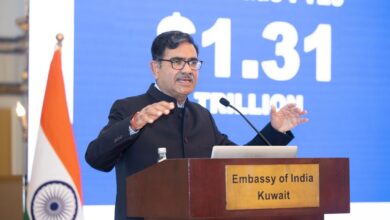From Satyajit Ray immortal classic to sci-fi Alpha, cinema meets its soul at Cannes
Beneath the glamour, however, lies a deeper reverence for the art of storytelling.

By Sundeep Bhutoria
Special to The Times Kuwait
Every May, the French Riviera transforms into a dazzling spectacle. For 12 days, Cannes becomes a world unto itself, filled with black-tie premieres, rosé-fueled conversations, and films that leave you breathless.
Beneath the glamour, however, lies a deeper reverence for the art of storytelling.
This year, the Cannes Film Festival promises to be a layered experience, blending past, present, and future. The festival opens with “Leave One Day” (Partir un jour), a vibrant musical comedy-drama by Amélie Bonnin. Other notable films include Ari Aster’s metaphysical thriller “Eddington,” Julia Ducournau’s provocative sci-fi “Alpha,” and Wes Anderson’s meticulously crafted mystery “The Phoenician Scheme.”

A standout moment this year was the screening of Satyajit Ray’s 1970 classic “Aranyer Din Ratri” (Days and Nights in the Forest) in the Cannes Classics section. Beautifully restored by the Shivendra Singh Dungarpur Foundation’s Film Heritage Foundation with help from Wes Anderson, this film is a testament to Ray’s mastery of world cinema. The film’s subtlety and nuance invite viewers to reflect on the complexities of human relationships.
Sharmila Tagore, who played Aparna in the film, and Simi Garewal, who played the enigmatic Duli, attended the screening alongside Wes Anderson. Tagore praised the film’s contemporary relevance, calling Cannes “world cinema at its finest.” Her Ray film “Devi” was nominated for the Palme d’Or in 1962.

“In a work that confirms Satyajit Ray’s place amongst the masters of world cinema, Days and Nights in the Forest…” reads the blurb introducing the film which is a quiet dismantling of urban superiority, set against the backdrop of a forest retreat.. “The first half has the appearance of a light comedy but there’s a steady modulation to a serious key,” is how Ray himself had described the film in a letter to fabled film critic and biographer Marie Seton.
Sharmila Tagore (who played Aparna) and Simi Garewal (the enigmatic Duli) were present at the screening alongside Wes Anderson.
“Aranyer Din Ratri “ she said ‘it is one of my most significant films’ …. Experiencing it on the big screen at Cannes will be fascinating,” Tagore recently said, while also referring to Cannes as “world cinema at its finest”. Her Ray film Devi was nominated in 1962 for Palme d’Or at Cannes.
“People who love cinema go to Cannes…. Some people just come for the buzz, ambience and atmosphere. A lot of things happen there.
Also present at the screening was Nicolas Facino, Director of Alliance Française du Bengale. His organisation played a key role in translating the restored version of Aranyer Din Ratri with French subtitles.
People have yachts, there are yacht parties, and parties galore every night. So, it’s a very buzzing place right now,” said Sharmila Tagore.
For those attending the festival, here’s a crash course in etiquette: arrive early, keep phones off, and avoid selfies. The dress code has been tightened, with sleek evening wear preferred over flashy statements. Don’t miss the sidebars, such as Un Certain Regard, Critics’ Week, or Directors’ Fortnight, where some of the most innovative filmmaking happens.
Beyond the screenings, Cannes is about experiencing the in-between moments – the stories you stumble upon while looking for something else. Be sure to indulge in the local cuisine, from flaky croissants to late-night moules-frites. Just be prepared for soaring prices during the festival.
Ultimately, Cannes is about communion – that collective breath a theatre takes when the lights go down. It’s about being moved by the same flicker of light across languages and oceans. As you attend the festival, go with open eyes and comfortable shoes, listen more than you speak, and dress for the scene you’re about to enter. And if you’re lucky, something you see will stay with you long after you leave.
(Mr Sundeep Bhutoria is a social and cultural activist known for promoting Indian arts and culture across the world. He has been involved in various initiatives, including Project Pronam, which supports elderly citizens, and Lockdown Live, which provided financial assistance to folk artists during the pandemic.)












